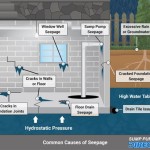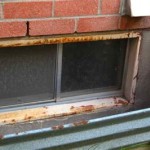How To Get Rid Of Large Spiders In Basement
Discovering large spiders in a basement can be unsettling. Basements often provide ideal conditions for spiders: darkness, dampness, and a relatively undisturbed environment with ample food sources in the form of other insects. Effectively managing spider populations in a basement requires a multi-faceted approach focused on eliminating their habitat, preventing entry, and directly controlling existing spiders.
Identifying Common Basement Spiders
Before implementing spider control measures, identifying the specific type of spider present can be beneficial. This knowledge can inform the selection of appropriate control methods and help to understand the spider's behavior. Some of the most common large spiders found in basements include:
Wolf Spiders: These spiders are large, hairy, and often brown or gray. They are active hunters and do not build webs but instead stalk their prey. Wolf spiders are known for their speed and are often mistaken for tarantulas due to their size.
Hobo Spiders: Similar in appearance to wolf spiders but typically slightly smaller, hobo spiders are also active hunters. Their bite can be venomous, although often not medically significant. Correct identification can be challenging even for professionals.
Cellar Spiders (Daddy Longlegs): While technically not spiders, but opiliones, they are often mistaken as such. They have long, thin legs and build loose, irregular webs in dark corners. They are generally harmless to humans.
Giant House Spiders: These are large, fast-moving spiders with long legs. They are often found near building foundations and can easily enter basements through cracks and openings.
Fishing Spiders: While less common in typical basements, fishing spiders may be found in basements that are particularly damp or have access points near water sources. They are large and can appear quite alarming.
Eliminating the Spider's Habitat: A Crucial First Step
The most effective long-term strategy for controlling basement spider populations is to make the environment less hospitable to them. This involves addressing the factors that attract spiders to the basement in the first place: food, shelter, and moisture.
Reduce Moisture: Spiders are attracted to damp environments. Addressing moisture issues is paramount. Consider the following steps:
Repair Leaks: Check for and repair any plumbing leaks, including leaky pipes, faucets, and water heaters. Even small drips can create a consistently damp area that attracts spiders.
Improve Ventilation: Proper ventilation helps to reduce humidity levels. Install or use a dehumidifier to maintain a dry environment. Ensure that basement windows and vents are properly sealed to prevent moisture from entering from outside.
Clear Gutters and Downspouts: Ensure that gutters and downspouts are clear of debris and are directing water away from the foundation of the house. This prevents water from seeping into the basement.
Remove Standing Water: Eliminate any sources of standing water in the basement, such as potted plant saucers or stagnant water in drains.
Control Insect Populations: Spiders feed on insects. Reducing the insect population in the basement will naturally decrease the spider population. Implement the following strategies:
Keep the Basement Clean: Regularly sweep and vacuum the basement to remove crumbs, dust, and dead insects. This eliminates food sources for insects that spiders prey on.
Eliminate Clutter: Clutter provides hiding places for insects and spiders. Remove boxes, old magazines, and other items that are not frequently used. If items must be stored in the basement, store them in airtight plastic containers to prevent insects from infesting them.
Use Insecticides Strategically: If insect populations are high, consider using insecticides to control them. Choose insecticides that are specifically labeled for indoor use and follow the label instructions carefully.
Seal Cracks and Openings: Spiders can enter the basement through even small cracks and openings in the foundation, walls, and around pipes. Sealing these entry points is critical to preventing spiders from entering.
Caulk Cracks: Use caulk to seal cracks in the foundation, walls, and around windows and doors. Pay particular attention to areas where pipes and wires enter the basement.
Weatherstrip Doors and Windows: Install weatherstripping around doors and windows to create a tight seal and prevent spiders from entering. Replace any damaged or worn weatherstripping.
Seal Openings Around Pipes: Use expanding foam or caulk to seal any openings around pipes that enter the basement. This will prevent spiders and other pests from entering through these openings.
Install Screens: Install screens on basement windows and vents to prevent spiders from entering. Ensure that the screens are in good repair and properly fitted.
Direct Spider Control Methods
While habitat modification and preventative measures are essential for long-term spider control, direct control methods may be necessary to immediately reduce the existing spider population in the basement. These methods include both physical removal and the use of insecticides.
Physical Removal: The simplest method is to physically remove spiders as they are seen. This can be done by:
Using a Vacuum Cleaner: Use a vacuum cleaner with a hose attachment to suck up spiders and their webs. Be sure to empty the vacuum cleaner bag or canister outside the house to prevent the spiders from escaping back into the basement.
Trapping Spiders: Use sticky traps to capture spiders. Place the traps along walls, in corners, and near known spider habitats. Check the traps regularly and replace them as needed.
Insecticides: Insecticides can be used to directly kill spiders. Choose insecticides that are specifically labeled for spider control and follow the label instructions carefully. Several types of insecticides are available:
Residual Sprays: These sprays leave a residue that kills spiders when they come into contact with it. Apply residual sprays to areas where spiders are known to travel, such as along walls, in corners, and around windows and doors. Be sure to follow the label instructions carefully and wear appropriate protective gear.
Contact Sprays: These sprays kill spiders on contact. They are effective for killing spiders that are directly sprayed, but they do not provide any residual control. Use contact sprays to kill spiders that are seen crawling around the basement.
Dust Insecticides: These fine powders can be applied to cracks, crevices, and other hard-to-reach areas where spiders may hide. Dust insecticides are particularly effective for controlling spiders in areas that are difficult to spray.
When using insecticides, it is essential to follow the label instructions carefully and to take precautions to protect yourself and your family. Wear appropriate protective gear, such as gloves and a mask, and keep children and pets away from treated areas until the insecticide has dried completely. It is also advisable to ventilate the basement after applying insecticides to reduce the risk of exposure.
Natural Repellents: While not always as effective as insecticides, some natural repellents may help to deter spiders from entering the basement. These repellents include:
Peppermint Oil: Spiders are repelled by the scent of peppermint oil. Mix a few drops of peppermint oil with water in a spray bottle and spray the mixture around the basement, particularly in areas where spiders are known to enter. Repeat this process regularly to maintain the repellent effect.
Vinegar: Vinegar is another natural repellent that can be used to deter spiders. Mix equal parts of vinegar and water in a spray bottle and spray the mixture around the basement. Vinegar can be especially effective around entry points.
Citrus Peels: Spiders are also repelled by the scent of citrus. Place citrus peels, such as orange or lemon peels, around the basement to deter spiders. Replace the peels regularly as they dry out and lose their scent.
Diatomaceous Earth: This natural powder is made from fossilized diatoms and is effective at killing spiders and other insects. Sprinkle diatomaceous earth around the foundation of the house and in areas where spiders are known to travel. Be sure to use food-grade diatomaceous earth, which is safe for use around pets and children.
By combining habitat modification, preventative measures, and direct control methods, it is possible to effectively manage spider populations in a basement and create a more comfortable and pest-free environment.

5 Ways To Get Rid Of Wolf Spiders In Basement

5 Ways To Get Rid Of Wolf Spiders In Basement

How To Get Rid Of Wolf Spiders In Basement 8 Easy Ways 2024

How To Deal With Wolf Spiders Ortho

How To Get Rid Of Spiders In Your Basement

Get Rid Of Basement Spiders Green Giant Home Commercial

How To Keep Wolf Spiders Away Protecting Your Home From These Pests

Get Rid Of Basement Spiders Green Giant Home Commercial

How To Get Rid Of Spiders In Your Basement Family Handyman

How To Get Rid Of Spiders In The Basement Love Home Designs
Related Posts







